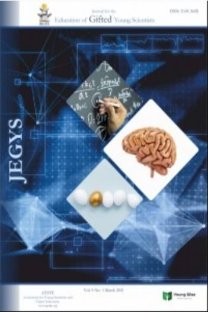The Effectiveness of Pre-Reading Activities on Gifted Students: A Case on Low Achievement Students
The main purpose of this study was to find out the effectiveness of using Pre-reading activities on students’ reading comprehension and their preference of Pre-reading activities. There were 55 first year college-aged students participating this study. The first experimental group was treated using Pre Reading Questioning, while the second experimental group using Pre Reading Vocabulary List. The primary data were collected from the students’ post-test, while the supporting data was gained through questionnaire. The primary data were collected, then analyzed by using independent t-test formula. The result of the t-test analysis was 0.041 (0.041<0.05), which means students who were taught using Pre-reading Questioning outperformed those who were taught using Pre-reading Vocabulary List in reading comprehension. From the questionnaire, Pre-reading Questioning gained higher preference from Pre-reading Vocabulary List. Pre-reading Questioning can make the students understand the text better and give them opportunity to practice thinking and analyzing than Pre-reading Vocabulary List. It means that applying Pre-reading Questioning is an effective way to teach reading comprehension.
___
- Al Rasheed, H.S.S. (2014). Examining the Effectiveness of Pre-reading Strategies on Saudi EFL. College Students’ Reading Comprehension. English Language Teaching, 7(11), 79 – 91. http://dx.doi.org/10.5539/elt.v7n11p79.
- Azizifar, A., Roshani, S., Gowhary, H., & Jamalinesari, A. (2015). The Effect of Pre-reading Activities on the Reading Comprehension Performance of Ilami High School Students. Social and Behavioral Sciences, 188–194. https://doi.org/10.1016/j.sbspro.2015.06.027.
- Benettayeb, A. (2010). Extensive Reading and Vocabulary Teaching. Revue Académique Des Études Sociales et Humaines, 3(1), 20–30.
- Bernhardt, B. (2004). Editorial: Maximizing success in phonological intervention. Child Language Teaching and Therapy, 20(3), 195 – 198.
- Bilokcuoğlu, L. H. (2011). The Effects of Pre-Reading Activities in EFL Classes on Students’ Reading Comprehension. EUL Journal of Social Sciences, 2(2): 79 – 97.
- Branch, A. (2016). The Effects of Pre-reading Activities on Reading Comprehension of Iranian EFL Learners. Advances in Language and Literary Studies, 7(3), 235–242. https://doi.org/10.7575/aiac.alls.v.7n.3p.235.
- Cabaroglu, N & Yurdasisik, A. (2008). University Instructors’ Views About and Approaches to Reading Instruction and reading Strategies. The Reading Matrix, 8(2): 133 – 154.
- Deeneey, T. (2016). Pre- and in-Service Teachers Reading and Discussing Informational Texts: Implications for Preparing Teachers to Meet the Common Core. SAGE Open, April-June 2016: 1–15. DOI: 10.1177/2158244016647994.
- Ekaningrum, V. C., & Prabandari, C. S. (2015). Students’ Perception on Pre -reading Activities in Basic Reading II Class of the English Language Education Study Program of Sanata Dharma. LLT Journal: A Journal on Language and Language Teaching, 18(2). DOI: https://doi.org/10.24071/llt.2015.180206.
- Hall, L.A. (2012). The Role of Reading Identities and Reading Abilities in Students’ Discussions About Texts and Comprehension Strategies. Journal of Literacy Research, 44(3): 239–272. DOI: 10.1177/1086296X12445370.
- Hashemi, A. (2016). The Impact of Content-based Pre-reading Activities on Iranian High School EFL Learners’ Reading Comprehension. Journal of Language Teaching and Research, 7(1), 137–145.
- Madaoui, R. (2013). Effects of Pre-Reading Activities on EFL Reading Comprehension by Moroccan College Students. Higher Education of Social Science, 4(3): 9–19.
- Marinaccio, J. (2012). The Most Effective Pre-reading Strategies for Comprehension. St. John Fisher College Fisher Digital Publications. Retrieved from (http://fisherpub.sjcf.edu/cgi/viewcontet.cgi?article=1209&context=education_ETD_masters), accessed on 30 January 2018.
- Mihara, K. (2011). Effects of Pre-Reading Strategies on EFL/ESL Reading Comprehension. TESL Canada Journal, 28(2), 51 – 73.
- Poedjiastutie, D. & Oliver, R. (2017). English Learning Needs of ESP Learners: Exploring Stakeholder Perceptions at an Indonesian University. TEFLIN Journal, 28(1), 1 – 21.
- Ponce, H.R. et.al. (2019). Study Activities That Foster Generative Learning: Notetaking, Graphic Organizer, and Questioning. Journal of Educational Computing Research, 0(0), 1 – 22. DOI: 10.1177/0735633119865554.
- Reynolds, D & Goodwin, A. (2016). Supporting Students Reading Complex Texts: Evidence for Motivational Scaffolding. AERA Open, 2(4): 1–16, October-December 2016. DOI: 10.1177/2332858416680353
- Taboada, A. & Guthrie, J.T. (2006). Contributions of Student Questioning and Prior Knowledge to Construction of Knowledge from Reading Information Text. Journal of Literacy Research, 38(1), 1–35.
- Yusuf, H. O. (2011). The Effect of Pre-reading Activities on Students’ Performance in Reading Comprehension in Senior Secondary Schools. Educational Research, 2(9), 1451–1455.
- Zakaria, Z., Setyosari, P., Sulton., & Kuswandi, D. (2019). The Effect of Art Based Learning to Improve Teaching Effectiveness in Pre-Service Teachers. Journal for the Education of Gifted Young Scientists, 7(3), 531-545. DOI: http://dx.doi.org/10.17478/jegys.606963.
- Başlangıç: 2013
- Yayıncı: Genç Bilge Yayıncılık
Sayıdaki Diğer Makaleler
Abu Yazid ABU BAKAR, Mohd Izwan MAHMUD
Fitria Fatichatul HİDAYAH, Muhamad IMADUDDİN, Dwi PRAPTANİNGRUM, Dwi RİSTANTİ
Juhji JUHJİ, Prasart NUANGCHALERM
Sri HARYATİ, Sukarno SUKARNO, Siswanto SİSWANTO, Surya GUMİLAR
Riza WEGANOFA, Nataria PRATİWİ, Ayu LİSKİNASİH, Gunadi Harry SULİSTYO
Cindy Asli PRAVESTİ, Bambang WİYONO, Dany Moenindyah DANY MOENİNDYAH, Triyono TRİYONO.FİP@UM.AC.İD, Adi ATMOKO
Moh ZAYYADİ, Toto NUSANTARA, Erry HİDAYANTO, I Made SULANDRA, Cholis SA'DIJAH
